



A recent study conducted by the All India Institute of Medical Sciences (AIIMS), Delhi, on breakthrough infections during April-May 2021 during the outbreak of the second wave of the coronavirus pandemic, has found that there were no deaths among vaccinated persons who were getting re-infected with COVID-19.
This was the first genomic sequence study conducted on breakthrough infections in India during the second wave. In layman terms, breakthrough infections are COVID-19 re-infections in vaccinated persons.
The AIIMS Delhi study on breakthrough infections confirmed that even in re-infected COVID-19 patients with a very high viral load, no death was reported among those who had received even one dose of the coronavirus vaccine.
AIIMS studied 63 breakthrough infection cases, out of which 36 patients had received both doses of COVID-19 vaccine, and 27 had got the first dose. Most of these patients had got the Covaxin jab (53), and 10 re-infected patients had taken Covishield shots.
As per the study, SARS-CoV-2 lineages were assigned to 57.1 percent of the samples, i.e., 36 of them. Out of these, 52.8 percent (19) were in patients who were fully vaccinated and 47.2 percent (17) in patients who had got just the first dose of the coronavirus vaccine.
The AIIMS researchers divided the B.1.617 variant or Delta strain -- which was first detected in India -- into three lineages: B.1.617.1, B.1.617.2, and B.1.617.3.
They found the B.1.617.2 variant to be predominant in 23 samples or 63.9 percent of the samples. Out of these, 12 were in fully vaccinated persons and 11 in partially vaccinated persons.
Meanwhile, the B.1.617.1 and B.1.1.7 lineages were found in four persons or 11.1 percent of the samples and one person, i.e., 2.8 percent of the samples, respectively.
Notably, none of the samples studied had comorbidities that could pose as predisposing factors in such cases.
The AIIMS COVID-19 study read: “Viral load at the time of diagnosis was high in all the patients irrespective of vaccination status or type of vaccine received and the initial course of disease with high-grade non-remitting fever lasted for five to seven days in the vaccinated group, similar to the clinical presentation in unvaccinated patients.”
It added: “While antibody levels for a subset of patients were available, they became infected nevertheless and presented to the emergency just like other patients, putting in doubt the protection offered and or clinical relevance of total immunoglobulin G (IgG) as a surrogate of COVID-19 immunity."
Follow our coverage of the coronavirus crisis here
Discover the latest Business News, Sensex, and Nifty updates. Obtain Personal Finance insights, tax queries, and expert opinions on Moneycontrol or download the Moneycontrol App to stay updated!